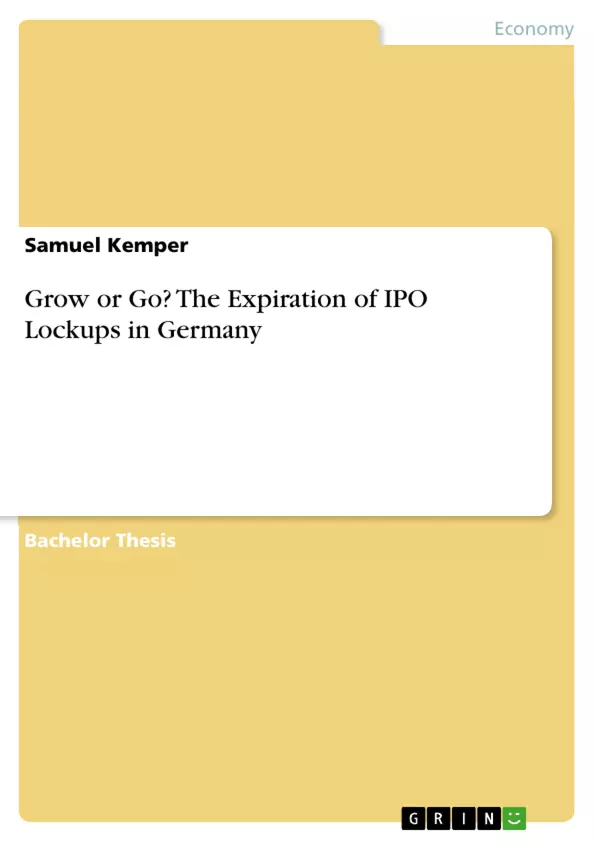In this study I examine the case of lockup period expirations for 142 IPOs in Germany between 2000 and 2019. I find significant abnormal returns around the expiration date of lockup periods during which existing shareholders are prevented from selling their shares. Both, abnormal returns and abnormal trading volumes around the unlock day are much larger for firms financed by venture capital or private equity. These findings are robust to different market models and are not due to market microstructure effects. When examining the cause for the observed abnormal returns abnormal trading volume and company size become prominent.
Inhaltsverzeichnis (Table of Contents)
- Introduction
- Related Literature
- Applied IPO Practice and Theory of Lockups
- IPO Lockup Expiration and Returns
- Data and sample design
- Methodology
- Results
- Empirical Findings and Cross-sectional Differences
- Conclusion
Zielsetzung und Themenschwerpunkte (Objectives and Key Themes)
The study aims to investigate the persistence of abnormal returns around lock-up expirations in the German market and analyze if these returns differ based on firm characteristics. It also seeks to compare these findings with previous research in both Germany and the United States. This research challenges the concept of strong market efficiency, especially in the context of publicly disclosed information like lock-up agreements.
- Abnormal returns around IPO lock-up expirations in the German market
- Cross-sectional differences in abnormal returns based on firm characteristics
- Comparison of findings with previous research in Germany and the US
- Examination of the implications of lock-up expirations on market efficiency
- Potential explanations for the observed abnormal returns
Zusammenfassung der Kapitel (Chapter Summaries)
- Introduction: This chapter provides an overview of the research topic, focusing on the concept of lock-up agreements in IPOs and their potential impact on market efficiency. It also introduces relevant past research, including studies by Field and Hanka (2001) and Nowak and Gropp (2002).
- Applied IPO Practice and Theory of Lockups: This chapter delves into the practical aspects of IPOs, explaining the roles of different parties involved and the rationale behind lock-up agreements. It explores the theoretical framework of IPO lockups and their relevance to market dynamics.
- IPO Lockup Expiration and Returns: This chapter outlines the methodology and data employed in the study. It then presents results regarding the existence of abnormal returns around lock-up expirations.
- Empirical Findings and Cross-sectional Differences: This chapter analyzes the significant differences in returns observed across various firm characteristics. It discusses potential explanations for the observed patterns and examines the relationship between abnormal returns and factors such as trading volume and bid-ask spreads.
Schlüsselwörter (Keywords)
This study focuses on IPO lockup expirations, abnormal returns, market efficiency, firm characteristics, venture capital-backed IPOs, private equity-backed IPOs, German market, and event study methodology.
Frequently Asked Questions
What is the focus of the "Grow or Go" study?
The study examines the expiration of IPO lockup periods for 142 companies in Germany between 2000 and 2019.
What are the main findings regarding returns?
The researcher found significant abnormal returns and abnormal trading volumes around the expiration date of lockup periods.
How does venture capital or private equity backing affect the results?
Abnormal returns and trading volumes are much larger for firms financed by venture capital or private equity compared to other firms.
What does this study suggest about market efficiency?
The findings challenge the concept of strong market efficiency, as abnormal returns persist despite the lockup agreements being publicly disclosed information.
Which factors are most prominent in causing abnormal returns?
Abnormal trading volume and company size were identified as prominent factors explaining the observed abnormal returns.
What methodology was used in the research?
The study utilizes an event study methodology and various market models to ensure the robustness of the findings.
- Citar trabajo
- Samuel Kemper (Autor), 2020, Grow or Go? The Expiration of IPO Lockups in Germany, Múnich, GRIN Verlag, https://www.grin.com/document/973724



